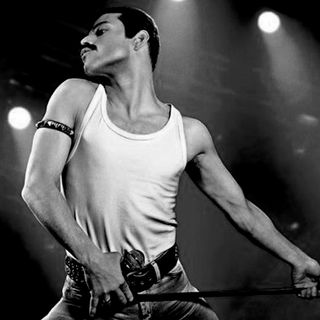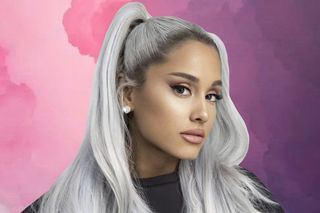
The Feminist Evolution of Ariana Grande Is Immensely Satisfying to Watch
Her donut-licking days feel far behind her.

When Ariana Grande dropped her latest single, “thank u, next” on November 3, just 30 minutes before her ex-fiancé, Pete Davidson, appeared on Saturday Night Live, the song title and their recent, public split, had everyone ready for the ultimate angry break-up song. But unlike a Taylor Swift reaction (shit-talking your ex is sometimes necessary) Grande’s song is no diss track — her message is one of empowerment, self-love, and healing.
Instead, she sings about how every one of her exes has taught her something, and made her the person she is today. The single is so representative of Grande: It’s the vocal equivalent of candy floss, pink-tinted and light, but it belies so much personal growth and resilience. In her four-octave range, Grande shows more maturity than we’re used to seeing in pop stars, and Ari, “for that we’re so thankful.”
In an arguably short span of time, Grande has seemingly come into her own. In 2014, she was still acting in a kid’s TV show, Sam & Cat, for Nickelodeon, and three years ago, TMZ published a bizarre video of her and her then boyfriend, licking donuts at a shop, with no intention of buying them. With rumors of diva behavior and tabloid feuds, the Grande back then was what you’d typically expect of a young pop star — someone who acts entitled, and often ridiculously, with no concern for anyone else.
But the same year saw Grande, badgered about the men she was dating, taking to social media to state, “I am tired of living in a world where women are mostly referred to as a man’s past, present, or future PROPERTY/POSSESSION. I. do not. belong. to anyone. but myself. and neither do you.” The note itself is worth reading, if you want to be convinced of the kind of sharp, intelligent opinions the young pop star has to offer, but the highlights include Grande pointing out that being empowered is not the same as being ‘a bitch,’ that women should be recognized for their own worth and not their partners, and a Gloria Steinem quote, because what feminist takedown is complete without one?
A clap-back in typical Ariana fashion — positive, undeniably feminist, and sharp af.
Two short years later, in 2017, after a suicide bomber attacked a concert where she was performing in Manchester, UK, she hosted a benefit, raising $23 million for victims and their families; in 2018, when ex-boyfriend Mac Miller died of a drug overdose, she honored his memory rather than respond to fans who blamed her for his death. The arc of her career seems to have coincided with her own personal growth, and the person she is today is not the pop diva she once seemed.
This evolution may be most apparent in how her songs are getting increasingly, not-so-subtly feminist. Her latest album, Sweetener, is being hailed as the pop album of the year, breaking global Spotify records. Unabashed in its feminist reimagining, the video for the album’s single, “God Is A Woman,” recreates Michelangelo’s “Creation of Adam” with Grande painted as god, and Madonna’s disembodied voice reading a passage from the Bible. When Grande sings, “And I can be all the things you told me not to be/ When you try to come for me, I keep on flourishing” it feels prophetic — she is undeniably flourishing as a person.
Grande is the third-most followed person on Instagram, and her 136 million followers are waiting impatiently for Sweetener‘s “thank u, next” video, which apparently features Grande in scenes reenacted from 90s and 00s movie classics 13 Going on 30, Legally Blonde, Bring It On, and Mean Girls— arguably, feminist coming-of-age movies for many women who, well, came of age in those decades. But more importantly, Grande uses her platform to show her 136 million followers, many of whom are probably impressionable and young, what a strong, feminist icon looks like in 2018.
While Grande’s characteristic high ponytail and ultra-short baby doll dresses may make you underestimate her, once you start looking further than the surface, the 25-year-old’s words, just like her song’s lyrics, reveal she is much more. She comes across as strong, confident, and assured in her self-worth. Her brand of feminism reflects this — it’s soft and comforting, about positivity and rising above things.
But don’t misread that softness either, because no one messes with the sisterhood.
Just this week, Grande shut down Piers Morgan who, after writing the most tone-deaf op-ed lambasting feminism for ruining everything, tweeted about the apparent hypocrisy of a British girl group, Little Mix, posing for a nude photo shoot. Shooting down Morgan’s archaic argument that women shouldn’t use nudity to sell records, Grande tweeted back, “I use my talent AND my sexuality all the time because i choose to. Women can be sexual AND talented. naked and dignified. it’s OUR choice. & we will keep fighting til people understand. i say this w all due respect but thank u, next.”
also @piersmorgan, i look forward to the day you realize there are other ways to go about making yourself relevant than to criticize young, beautiful, successful women for everything they do. i think that’ll be a beautiful thing for you and your career or what’s left of it. 🖤
A clap-back in typical Ariana fashion — positive, undeniably feminist, and sharp af.
Nadia Nooreyezdan is The Swaddle's culture editor. Since graduating from Columbia Journalism School, she spends her time thinking about aliens, cyborgs, and social justice sci-fi. She's also working on a memoir about her family's journey from Iran to India.
Related


Jameela Jamil Reminds Us of the Hypocrisy in Celebrity Endorsements
